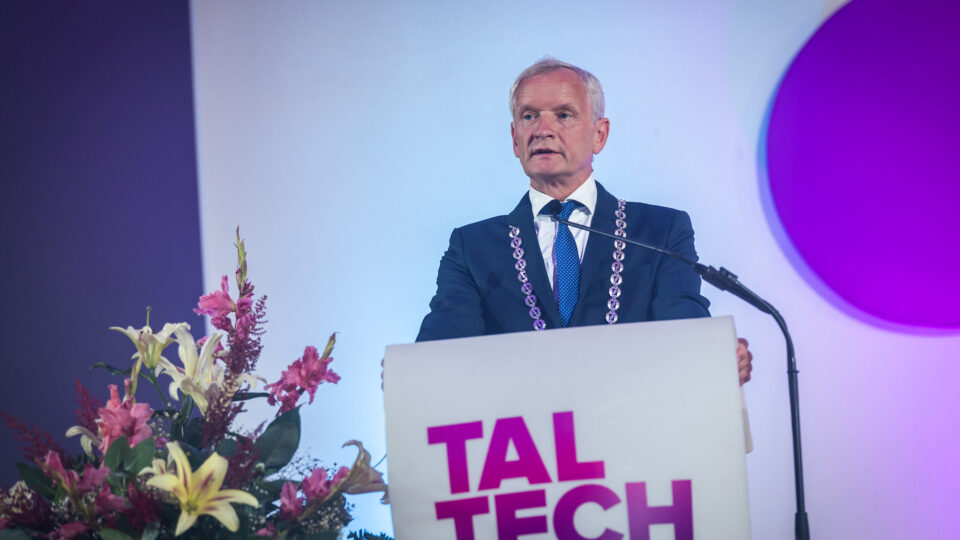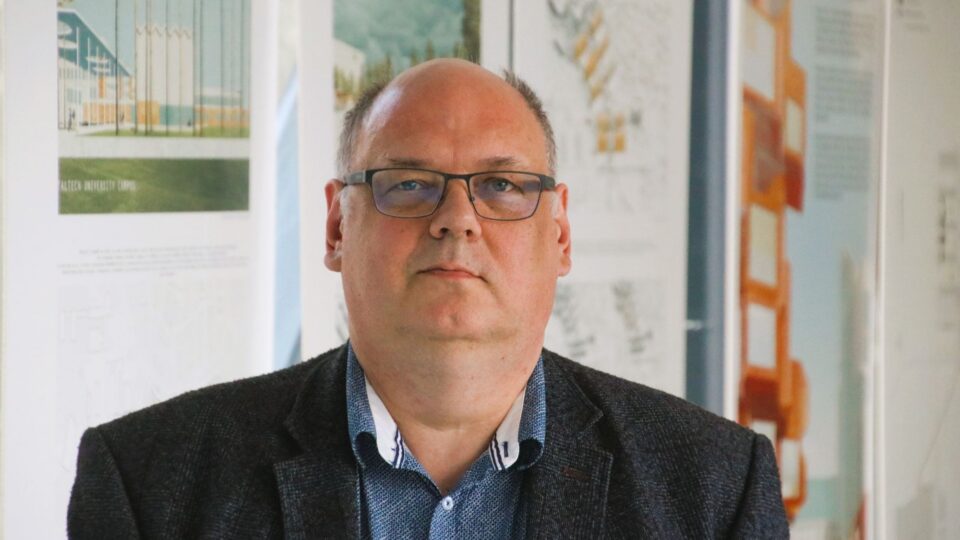This autumn, Professor Caspar van den Berg from the University of Groningen was appointed an honorary doctor at Tallinn University of Technology. His connection with the Ragnar Nurkse Department of Innovation and Governance has endured for over a decade in his role as a visiting professor of public administration. In addition to various academic positions, Professor van den Berg has served as the president of the Association of Universities in the Netherlands and as a member of the Upper House of the Dutch Parliament. This makes him one of Europe’s leading scholars in public administration. Below, we present an abridged version of Professor van den Berg’s honorary doctorate speech.
Universities must renew their social contracts to maintain scientific leadership and societal legitimacy. This is crucial for our ability to address pressing global challenges, such as climate change, information overload, and geopolitical shifts.
Universities and societal challenges
Societies are experiencing profound uncertainty. Climate change, the consequences of information overload spread through social media, shifting global power dynamics, and even war on our continent–these are just a few of the significant challenges we face. Innovation and research within universities play a crucial role in tackling these challenges.
However, academic core values–especially academic freedom–are increasingly under threat, either through direct government intervention, as seen in Hungary, or through indirect influence, as observed in the Netherlands during the so-called “nitrogen case,” when public attitudes toward scientists became increasingly hostile. Universities must navigate these paradoxical pressures, as demonstrated by recent protests concerning the Middle East. While protests can intimidate faculty and students, banning them undermines core values such as academic freedom, free exchange of ideas, and freedom of speech.
Academic core values–especially academic freedom–are increasingly under threat, either through direct government intervention or indirect influence.
Resisting the rise of authoritarianism
As neuroscience research shows, the global rise of authoritarianism has a clear foundation. The longing for strong leadership stems from the brain’s need to reduce uncertainty–something that the modern world, with its myriad challenges, provides in abundance. This desire for certainty, however, stands in stark contrast to the academic ethos of questioning and doubt. Academia thrives on uncertainty. The scientific method–one of our most powerful tools for understanding the natural world–is paradoxical. We ask questions and continue asking them indefinitely, often without definitive answers. Even when we arrive at conclusions, we leave room for doubt and future refutations. This is profoundly unsatisfying in an age that craves absolute answers, and universities frequently face demands to take political stances.
The position of universities on politics and the state is well captured in the Kalven Report, a document written by the University of Chicago in 1967 during widespread student protests against the Vietnam War. The report emphasized that universities should provide a platform for individuals to express their views and participate in discourse while remaining institutionally neutral. This widely accepted stance is now under pressure. Society increasingly seeks to involve science in decision-making and foster participation from diverse interest groups, placing political pressure on academia. At the same time, the endorsement of science or scientists is often misused as a mark of quality or a tool to silence criticism. Science can be politicized to a surprising degree. Still, when science is weaponized for political ends, it provides a compelling reason to separate the academic role from the personal views of individual scholars.
Universities should provide a platform for individuals to express their views and participate in discourse while remaining institutionally neutral.

Protests may intimidate staff and students, but banning them undermines core values: academic freedom, free exchange of ideas, and freedom of speech | Photo: Manny Becerra/Unsplash
The challenge of the “enabling state” for universities
European and global universities strive to avoid state intervention. Today’s state has been described as an “enabling state,” offering a golden middle ground between a completely free market and a classical welfare society. The modern state has a smaller government sector than an active, productive welfare state but is somewhat more significant than a minimal “night-watchman state.”
However, universities seem to be getting the worst of both worlds. Governments are increasingly intervening in their financial management, making funding temporary and conditional, expanding bureaucracy, and limiting flexibility. At the same time, political issues influence their internal organization, leading to more rules and regulations.
Previously, internationalization helped mitigate the challenges of declining demographics and shrinking financial resources. It allowed universities to attract talent, enhance the quality of education, and promote a knowledge-based economy and innovation. However, the influx of international students has become an immigration issue, and restrictions no longer allow universities to compensate for domestic shortfalls with foreign students.
We are already seeing the consequences of this in the United Kingdom. Institutions are restructuring, consolidating, merging, and, in some cases, shutting down. The Netherlands must make significant efforts to maintain its position among the world’s leading academic nations—despite political pressures that reduce global cooperation, a shrinking domestic market, and conditions that do not favour academia or intellectualism.
It is worth asking whether these challenges are merely short-term inconveniences that universities must endure or whether they require a fundamental reconsideration of core principles–including the associated risks–and the choice of a new strategic direction.
Governments are increasingly intervening in their financial management, making funding temporary and conditional, expanding bureaucracy, and limiting flexibility.

University of Groningen | Photo: Wutsje/Wikimedia Commons
Universities: wise advisors or court jesters?
Historically, rulers have had two key advisors: the Wise Man and the Court Jester. It seems self-evident that academia’s role is to be the Wise Man. Research suggests that over 65% of people believe scientific research should benefit society directly. Taxpayers fund public universities and are therefore expected to serve the public good. In this context, society becomes the client–the client is king.
However, this expectation comes with the risk of losing academic freedom. The Wise Man must carefully weigh his words to avoid offending the Majesty.
The alternative is to be the Jester–the one who could openly challenge the king, speak freely without fear of consequences, and thereby prompt the ruler to reconsider decisions. In many ways, this role is closer to how academics see themselves. A university is an institution that challenges established ideas and upholds absolute freedom of thought. Society needs such spaces–not as playgrounds for the academic elite but as environments that drive intellectual renewal and provide an antidote to the demand for simplistic solutions to complex problems.
A university is an institution that challenges established ideas and upholds absolute freedom of thought. Society needs such spaces–not as playgrounds for the academic elite but as environments that drive intellectual renewal and provide an antidote to the demand for simplistic solutions to complex problems.
A new social contract
The challenge for universities today is to balance their dual social role and renew their social contract. This cannot be done without reaffirming their commitment to academic freedom and innovation. A new contract must emerge from an open dialogue about how universities can contribute to solving societal problems and supporting economic prosperity without compromising their institutional independence.
The university’s thousand-year history of resilience in the face of crises demonstrates its ability to adapt and evolve. By reaffirming their core values, universities can continue to contribute to civilization’s progress.
The full text of Prof. Dr. Dr.h.c.des. Caspar van den Berg’s honorary doctorate speech will be published in the next issue of the journal Halduskultuur (Issue 23(1-2)).




